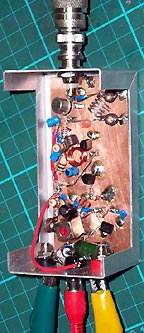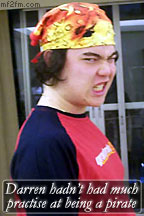Thursday 13 March, 2008, 08:41 - Pirate/Clandestine
Posted by Administrator
Posted by Administrator
 Finding a frequency must be one of the most fraught tasks for any prospective London pirate radio operators. The band is now so crammed with stations that there are next to no gaps anywhere. The problem is not made any easier by the BBC using lots of frequencies to infill coverage of its local stations; nor by the new wave of community stations taking to the air. Now don't get me wrong, BBC, commercial and community radio stations have a licence and are authorised and legitimate users of the FM band and as such should be respected, and nothing hereinafter should be in any way taken as non-recognition of that important fact. But the fact also remains that pirate radio stations exist and are likely to continue to exist until technology renders them irrelevant and that finding a frequency that doesn't cause interference to these legitimate users, which is a goal to be aimed for if both legal and illegal stations are to co-exist, is nigh-on impossible.
Finding a frequency must be one of the most fraught tasks for any prospective London pirate radio operators. The band is now so crammed with stations that there are next to no gaps anywhere. The problem is not made any easier by the BBC using lots of frequencies to infill coverage of its local stations; nor by the new wave of community stations taking to the air. Now don't get me wrong, BBC, commercial and community radio stations have a licence and are authorised and legitimate users of the FM band and as such should be respected, and nothing hereinafter should be in any way taken as non-recognition of that important fact. But the fact also remains that pirate radio stations exist and are likely to continue to exist until technology renders them irrelevant and that finding a frequency that doesn't cause interference to these legitimate users, which is a goal to be aimed for if both legal and illegal stations are to co-exist, is nigh-on impossible. Since 2000 Ofcom (and its predecessor the Radiocommunications Agency) have been aware (through an oft overlooked study that examined the re-planning of the FM band) that there are small pockets of the FM band that could be used for low-power, limited geographical coverage transmitters in and around London, and it is the results of this study that are, to a large extent, enabling the licensing of the community stations. It's also interesting to note that many of these community stations are using frequencies that were esrtwhile used by pirates. Question: If they can now be used legally for such services without causing interference, can it be completely true that when being used illegally by pirates that the interference they cause was really so bad? Well the power of the community stations is typically less than 100 Watts and they are specifically located in areas where the frequencies they use will not cause interference, whereas the pirates on the same frequencies were often using 250 Watts or more in an attempt to cover a much wider, or a different, area. So it is quite likely that the pirates did cause interference in some areas, but clearly not in others.
Since 2000 Ofcom (and its predecessor the Radiocommunications Agency) have been aware (through an oft overlooked study that examined the re-planning of the FM band) that there are small pockets of the FM band that could be used for low-power, limited geographical coverage transmitters in and around London, and it is the results of this study that are, to a large extent, enabling the licensing of the community stations. It's also interesting to note that many of these community stations are using frequencies that were esrtwhile used by pirates. Question: If they can now be used legally for such services without causing interference, can it be completely true that when being used illegally by pirates that the interference they cause was really so bad? Well the power of the community stations is typically less than 100 Watts and they are specifically located in areas where the frequencies they use will not cause interference, whereas the pirates on the same frequencies were often using 250 Watts or more in an attempt to cover a much wider, or a different, area. So it is quite likely that the pirates did cause interference in some areas, but clearly not in others. One of the interesting side-effects of this use of previous 'pirate' frequencies by the new community stations is that the pirates have been forced to take action to try and maintain their coverage and listenership without causing (too many) problems to the new stations. Blasting several hundred Watts over the top of a new community stations is the perfect recipe to get busted. Hats off, therefore, to Passion FM who, having been forced off their long-time frequency of 91.8 MHz by community station Hayes FM in West London, have taken to using two different frequencies, with directional antennas, to protect Hayes FM yet maintain their service area. Passion can now be found in East London on 91.8 MHz and in West London on 97.9 MHz, thereby making an effort not to interfere with Hayes FM at the expense of having two lots of transmitters to replace each time they are taken off-air.
One of the interesting side-effects of this use of previous 'pirate' frequencies by the new community stations is that the pirates have been forced to take action to try and maintain their coverage and listenership without causing (too many) problems to the new stations. Blasting several hundred Watts over the top of a new community stations is the perfect recipe to get busted. Hats off, therefore, to Passion FM who, having been forced off their long-time frequency of 91.8 MHz by community station Hayes FM in West London, have taken to using two different frequencies, with directional antennas, to protect Hayes FM yet maintain their service area. Passion can now be found in East London on 91.8 MHz and in West London on 97.9 MHz, thereby making an effort not to interfere with Hayes FM at the expense of having two lots of transmitters to replace each time they are taken off-air. West Londoners Point Blank FM also deserve a mention. They are broadcasting to South West London on 103.6 MHz (and thus avoiding Life FM in Harlesden, North London and TGR Sound on 103.7 MHz in South East London) and to Central London on 90.2 MHz, having moved off 108.0 MHz where they used to cause undue interference to Radio Jackie on 107.8 MHz. 108.0 is now used by Unknown FM whose service area, being further East causes fewer problems to Jackie. Both Passion FM and Point Blank FM use the correct RDS Alternative Frequency ('AF') flag so that listeners driving around London will automatically be re-tuned to the clearest frequency - smart! Freeze FM are also 'dual-casting' on 92.7 and 99.5 MHz - it's not clear why but possibly one of the community stations yet to come on-air (Radio Ummah and Irish FM) may use a frequency near 92.7.
West Londoners Point Blank FM also deserve a mention. They are broadcasting to South West London on 103.6 MHz (and thus avoiding Life FM in Harlesden, North London and TGR Sound on 103.7 MHz in South East London) and to Central London on 90.2 MHz, having moved off 108.0 MHz where they used to cause undue interference to Radio Jackie on 107.8 MHz. 108.0 is now used by Unknown FM whose service area, being further East causes fewer problems to Jackie. Both Passion FM and Point Blank FM use the correct RDS Alternative Frequency ('AF') flag so that listeners driving around London will automatically be re-tuned to the clearest frequency - smart! Freeze FM are also 'dual-casting' on 92.7 and 99.5 MHz - it's not clear why but possibly one of the community stations yet to come on-air (Radio Ummah and Irish FM) may use a frequency near 92.7.Pirates are often accused of not caring about interference to other stations, but the actions of these stations would tend to suggest that they do take some care - not least, perhaps, to protect themselves from an excessive number of raids from the authorities.
For the record, other pirate/community frequency clashes that will no doubt resolve themselves in the end are Westside FM (Southhall, West London) and Select-UK (Rotherhithe, South London), both on 89.6 MHz, Nu-Sound (Forest Gate, East London) and Powerjam (Battersea, South London) on 92.0 MHz, and Voice of Africa (Newham, East London) and Tempo on 94.3 and 94.4 MHz respectively.
2 comments
( 2484 views )
| permalink
| 



 ( 3 / 28299 )
( 3 / 28299 )




 ( 3 / 28299 )
( 3 / 28299 )

